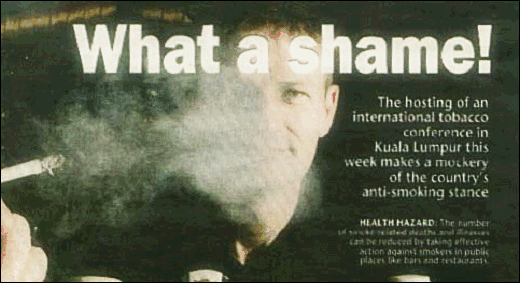What a shame!
Dato' Dzulkifli Abd Razak
Article
New Sunday Times - 11/13/2005
THE Health Minister seemed irritated last week by tobacco companies negating the Government’s efforts to reduce the number of smokers.
He may not have realised it it but this action by the tobacco companies is nothing new. According to a study published in the authoritative Tobacco Control Journal (December 2004), the so-called "negation" has been an on-going strategy adopted by the industry since the 1970s.

Perhaps the ministry has not taken this seriously or has been unaware of it and this has emboldened the industry to take part in the latest "sabotage".
But what about the green light given to organise one of the largest International Tobacco Conference and Exposition in Kuala Lumpur tomorrow?
Who is working hand in glove in the "sabotage" in this case? Worse, this is despite numerous appeals and protests by health activists at home and abroad.
Apart from a few mild responses from the powers that be, plus some unlikely outbursts, generally it has been business as usual.
What is obvious is that while we struggle to make sense of the country’s tobacco control policy, our neighbours are many steps ahead of us.
For example, Singapore has announced that it is broadening the ban on tobacco use, while in Thailand the discussion is about dissolving the tobacco monopoly there, and even closing it down.
This is despite Thailand having much more to lose in taking such firm action, given the size of its industry.
Hence, unlike Malaysia, Thailand and Singapore are recognised as fine examples in pursuing effective tobacco control policies.
The question is: How is it that the Thais and Singaporeans can have different priorities when it comes to valuing the lives of their people over tobacco monies?
If you think this just a Third World preoccupation, let us study what Ireland achieved in a short period of 24 months.
Ireland became the first country in the world to ban smoking in bars and restaurants nationwide.
The bold initiative paid off, bringing immediate health benefits, according to the director of the Dublin-based Research Institute for a Tobacco-Free Society (New Scientist, Sept 24).
Studies on air quality and staff health in 40 pubs in Dublin showed substantially fewer lung-damaging particles in the air.
Levels of particles that are less than 10 micrometres (PM10) in diameter fell by 53 per cent.
For smaller particles, PM2.5, it was down 90 per cent. For finer particles under PM1 it was down 80 per cent, matching the typical situation in homes, noted the report.
More than this, the workers were healthier too, as measured by the amount of potentially toxic carbon monoxide (CO) they exhaled, as an indicator of their exposure to tobacco smoke.
It was also reported that the concentration exhaled by the 80 bar workers examined fell from about five parts of CO per million (ppm) of air to just about three ppm, a significant drop of 40 per cent.
Similarly, symptoms of respiratory difficulties such as wheezing fell by 40 per cent. Cases of smoke irritation, including watery eyes, was down by 70 per cent.
Once again, how is it that the Irish can have different priorities compared with Malaysia, valuing the lives of their people rather than that of tobacco companies?
Although, Malaysia too has designated no-smoking areas, it is not as extensive as that in Ireland. More worrying also is its effective implementation.
Is this another indication that we value the lives of Malaysians less and do not want to offend the tobacco companies?
Given the convincing results from the Irish experience, there is no reason now why we need to put off taking action any longer.
It was not so long ago that the Human Resources Ministry raised concerns about the health of workers and tobacco smoke in an indoor environment under the proposed Air Quality Regulations.
In November 2002, the minister was quoted as saying that people were increasingly falling ill due to the smoke-filled work environment.
There was then a sense of urgency leading this column to throw a challenge in June to keep the in-door air quality at the domestic gates at the Kuala Lumpur International Airport clean and smoke-free.
This is especially so considering where the so-called "smoking room" is located.
The stale unhealthy air is an indication that the areas outside the smoking room are continuously being polluted.
In all probability, this is due to the "leaky" smoking room nearby as the doors keep opening and shutting all the time. Unfortunately, no action has been taken and today thousands of unsuspecting travellers are being exposed to cigarette smoke.
The airport authorities are turning the area around the smoking room into shopping outlets to attract more passengers to shop — and unknowingly inhale the polluted air.
In other words, more than ever, the smoking room at KLIA is becoming a dangerous source of poisonous fumes and this room must be urgently relocated.
In many developed countries, such smoking rooms in airports are already history.
Why are we so helpless in dealing with the unscrupulous tobacco industry despite the Health Ministry’s latest set of grim statistics suggesting that more than 2.3 million Malaysian smokers are at risk of chronic diseases (NST, Oct 11)?
The situation is getting even more pressing with Kuala Lumpur hosting the region’s largest tobacco trade conference-cum-exposition called the "TABINFO 2005" tomorrow and Tuesday (www.etm2005.com).
To add insult to injury, Malaysia Airlines is the official carrier, making nonsense of its no-smoking policy. The conference puts Malaysia to shame in the eyes of the world.
This confirms that the local tobacco industry is indeed effective in undermining the Government’s tobacco control policy, yet again.
It exposes the serious lack of political will in curbing tobacco use, as the authorities, without shame, have turned their backs on the tens of thousands of Malaysian citizens who die annually. Who will be accountable for this senseless loss of lives?
